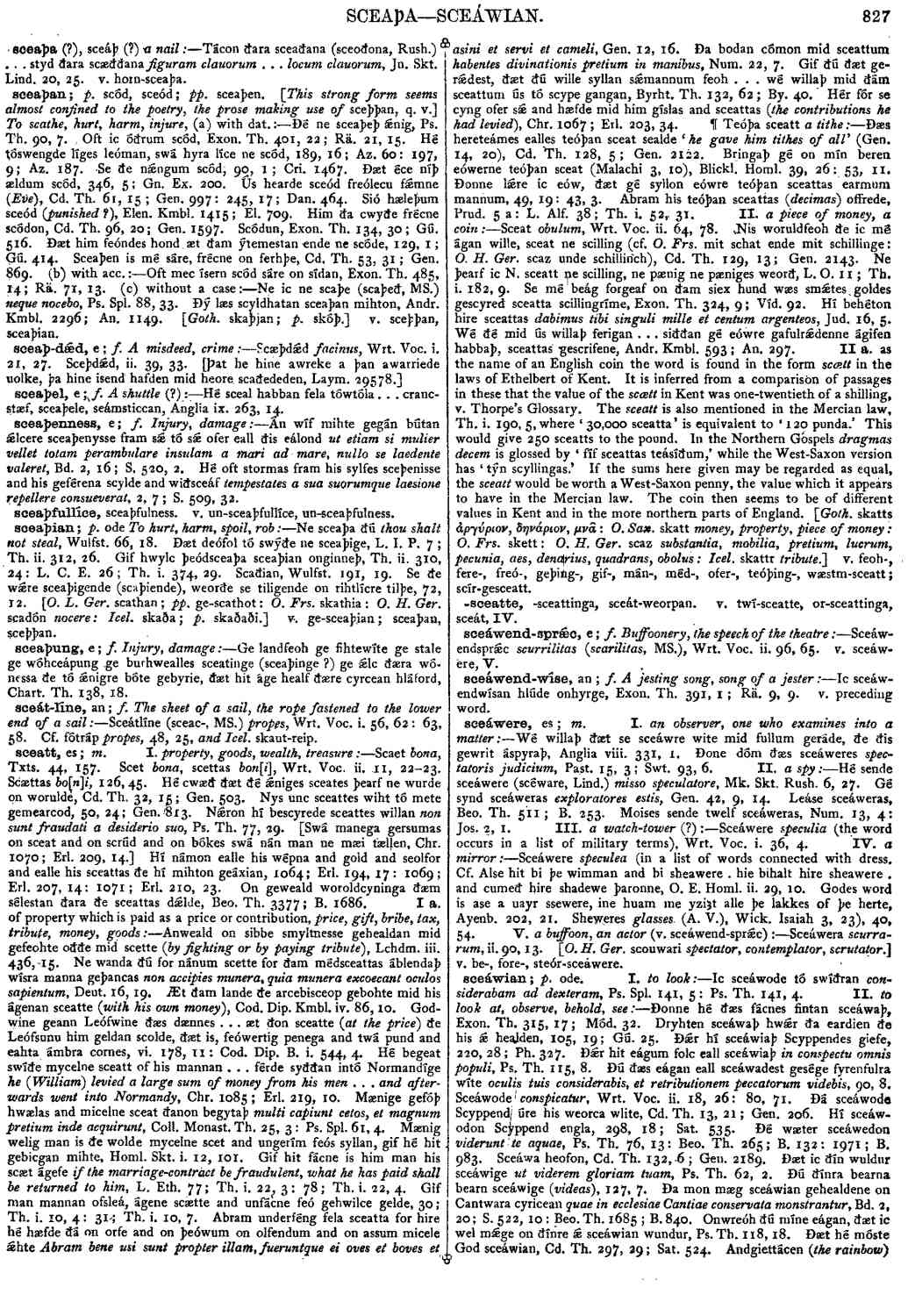sceáwian
- verb [ weak ]
-
Ic sceáwode tó swíðran
considerabam ad dexteram.
- Ps. Spl. 141, 5: Ps. Th. 141, 4.
-
Ðonne hé ðæs fácnes fintan sceáwaþ,
- Exon. Th. 315, 17; Mód. 32.
-
Dryhten sceáwaþ hwǽr ða eardien ðe his ǽ healden,
- 105, 19; Gú. 25.
-
Ðǽr hí sceáwiaþ Scyppendes giefe,
- 220, 28; Ph. 327.
-
Ðǽr hit eágum folc eall sceáwiaþ
in conspectu omnis populi,
- Ps. Th. 115, 8.
-
Ðú ðæs eágan eall sceáwadest gesége fyrenfulra wíte
oculis tuis considerabis, et retributionem peccatorum videbis,
- 90, 8.
-
Sceáwode
conspicatur,
- Wrt. Voc. ii. 18, 26: 80, 71.
-
Ðá sceáwode Scyppend úre his weorca wlite,
- Cd. Th. 13, 21; Gen. 206.
-
Hí sceáwodon Scyppend engla,
- 298, 18; Sat. 535.
-
Ðé wæter sceáwedon
viderunt te aquae,
- Ps. Th. 76, 13: Beo. Th. 265; B. 132: 1971; B. 983.
-
Sceáwa heofon,
- Cd. Th. 132, 6; Gen. 2189.
-
Ðæt ic ðín wuldur sceáwige
ut viderem gloriam tuam,
- Ps. Th. 62, 2.
-
Ðú ðínra bearna bearn sceáwige (
videas
),- 127, 7.
-
Ða mon mæg sceáwian gehealdene on Cantwara cyricean
quae in ecclesiae Cantiae conservata monsirantur,
- Bd. 2, 20; S. 522, 10: Beo. Th. 1685; B. 840.
-
Onwreóh ðú míne eágan, ðæt ic wel mǽge on ðínre ǽ sceáwian wundur,
- Ps. Th. 118, 18.
-
Ðæt hé móste God sceáwian,
- Cd. Th. 297, 29; Sat. 524.
-
Andgiettácen (
the rainbow
)sceáwigan,- 93, 4; Gen. 1540.
-
Ðæt mæg mon on bócum sceáwigean, hú monega gewin hé dreógende wæs,
- Ors. 1, 11; Swt. 50, 25.
-
Hwylce ða nú synd tó sceáwigenne
quales illi nunc appareant,
- L. Ecg. P. iv. 66; Th. ii. 226, 21.
-
Tó sceáwianne,
- Exon. Th. 57, 7; Cri. 915.
-
Sceáwiendum
contemplantibus, intuentibus,
- Wrt. Voc. ii. 134, 83.
-
Ic sceáwiu wegas ðíne
'I will have respect unto thy ways'
(A.- V.), Ps. Surt. 118, 15.
-
Hé hyra dǽde sceáwaþ
God will regard the deeds of the charitable,
- Exon. Th. 106, 35; Gú. 51.
-
Hé sceáwode ða eáþmódnesse his þeówene
respexit humilitatem ancillae suae,
- Blickl. Homl. 7, 3.
-
Sceáwa (
respice
) ðis folc,- Ex. 33, 13.
-
Cyning eallwihta Caines ne wolde tiber sceáwian
'to Cain and to his offering the Lord had not respect'
(A.- V. Gen. 4, 5), Cd. Th. 60, 9; Gen. 979.
-
Sceáwaþ
speculatur,
- Wülck. Gl. 250, 8.
-
Ðá ðæt eall gedón wæs swá se geótere ðæm æðelinge ǽr behét se æðeling ðæt ðá sceáwode
when all that was done as the founder (Perillus) promised the prince (Phalaris), the prince then inspected it,
- Ors. 1, 12; Swt. 54, 29.
-
Se cyng sceáwode ðæt mádmehús and ða gersuman ðe his fæder ǽr gegaderode,
- Chr. 1086; Erl. 223, 27.
-
Ðonne seó ádl cume ǽrest on ðone mannan, ðonne sceáwa his tungan,
- Lchdm. ii. 280, 8.
-
Sceáwiaþ ða lilian hú hí wexaþ
considerate lilia quomodo crescunt,
- Lk. Skt. 12, 27.
-
Ic eów bidde ðæt ánra manna gehwylc sceáwige hine sylfne on his heortan,
- Blickl. Homl. 57, 33: 107, 13.
-
Moyses sende and hét sceáwian Azer
misit Moyses, qui explorarent Jazer,
- Num. 21, 32.
-
Iosue ásende twegen sceáweras dígellíce and hét sceáwian ðæt land,
- Jos. 2, 1.
-
Him ðá féran gewát land sceáwian,
- Cd. Th. 106, 33; Gen. 1780: Beo. Th. 2831; B. 1413.
-
Hord sceáwian,
- 5481; B. 2744.
-
Land sceáwigan,
- Cd. Th. 115, 16; Gen. 1920.
-
Ðá ongon ic geornlícor ðá stówe sceáwigan and geond ða bearwas gongan
igitur perambulare totum nemus incipio,
- Nar. 27, 20.
-
Ceós ðé menn ðæt magon sceáwigean ðone eard
mitte viros, qui considerent terram,
- Num. 13, 3.
-
Gé cómon ðis land tó sceáwienne,
- Gen. 42, 12.
-
Ðá sceáwode man þreó þegnas of ðam gemóte
three thanes were chosen from the moot (to go on a certain business ),
- Chart. Th. 337, 12.
-
Gyf ðú énigne gódne heorde hæbbe ... sceáwa hyne mé; gyf ðú ðonne nánne swá gerádne næbbe, séc hyne óð ðú hyne finde,
- Shrn. 164, 31.
-
Se ðe ðás gemót forbúge, ðonne sceáwige (scifte,
- MS. D.)
-
Him Loth gewát wíc sceáwian óþ ðæt hié eorþscræf fundon
Lot went seeking a dwelling, until they found a cave,
- Cd. Th. 156, 24; Gen. 2593.
-
Drihtnes earc fór beforan him þrí dagas sceáwiende ða wícstówa
providens castrorum locum,
- Num. 10, 33.
-
Ðá geornde se eorl griðes and gísla ... Ðá wyrnde him mann ðera gísla and sceáwede him maim .v. nihta grið út of lande tó farenne
then the earl asked for safe-conduct and hostages. ... The hostages were refused him, and safe-conduct during five days was granted him to go out of the country,
- Chr. 1048; Erl. 180, 11-14.
Bosworth, Joseph. “sceáwian.” In An Anglo-Saxon Dictionary Online, edited by Thomas Northcote Toller, Christ Sean, and Ondřej Tichy. Prague: Faculty of Arts, Charles University, 2014. https://bosworthtoller.com/26645.
Checked: 0